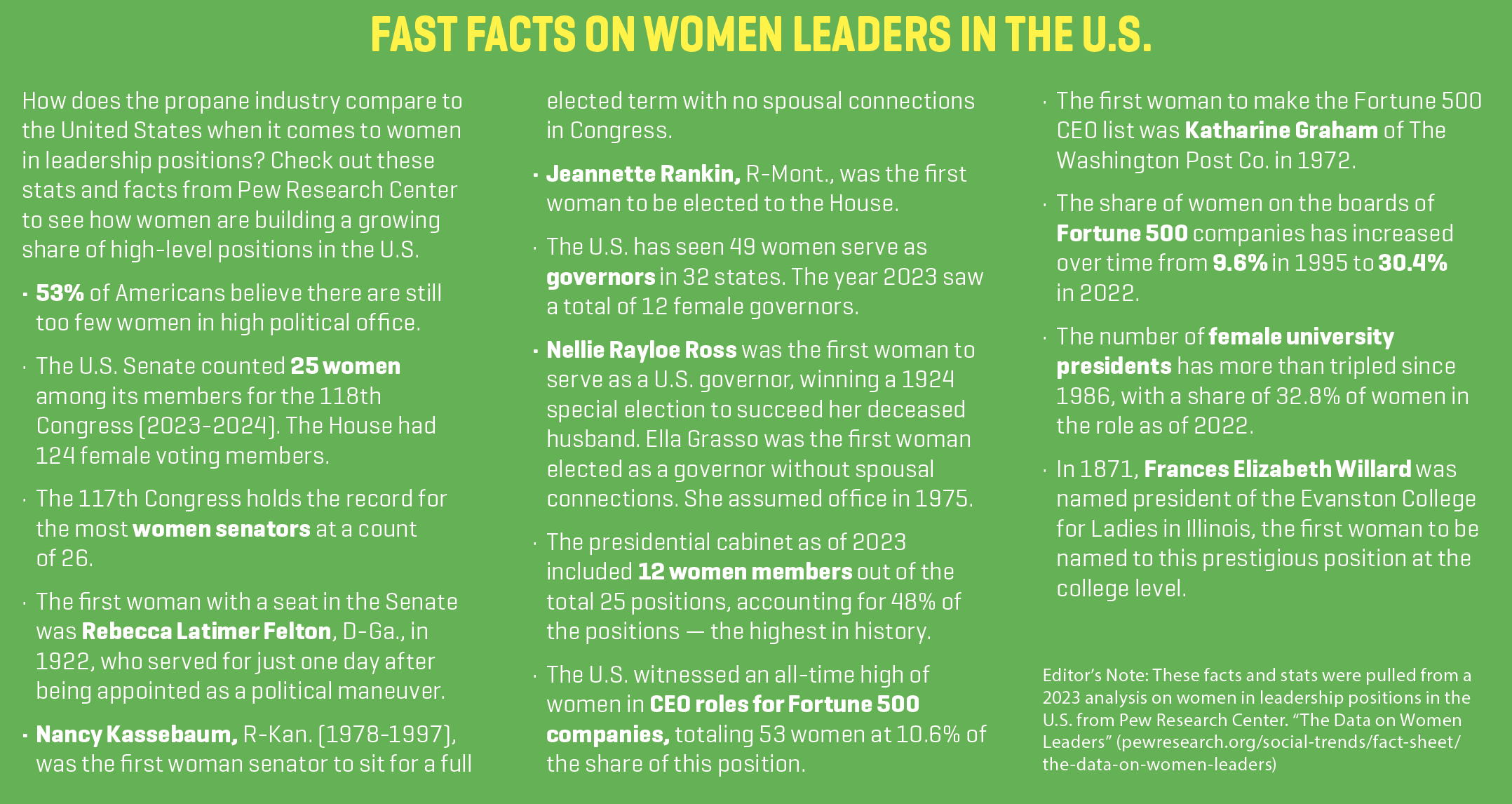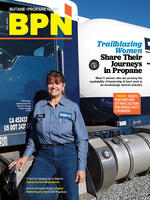
Every year, BPN features the Women in Propane special section to tell the stories of this segment of the industry — a segment that’s continually growing. As you’ll read in the pages ahead, the National Propane Gas Association board of directors, for example, has grown from less than 1% women members in 2011 to around 13% in 2024. Though there’s still plenty of room left to grow, that’s a percentage jump worth celebrating. According to an analysis by Pew Research Center in the fall of 2023, 10.6% of Fortune 500 chief executives were women and company boards filled 30.4% of their seats with women members, putting the propane industry’s female leadership in a comparable range to the wider business world.
To celebrate the accomplishments of women in the industry, we present this special section as a way to learn more of the personal stories behind the phrase “women in propane.” This phrase encompasses so much more than giving women a seat at the table in the industry. It’s about understanding why the industry needs women in those seats, from the boardroom chair to the driver’s seat. It’s about understanding where these women came from and where they’re going. It’s about fostering an equitable inclusion of both women and men in all aspects of business. And it’s about naming the contributions women have made to the industry in the past and present in the hopes of inspiring more in the future.
What does it mean to be a leader? And what qualities can women in particular bring into the propane industry’s leadership conversation? To gain some insight into these questions, BPN heard from industry leaders Tamria Zertuche, president and CEO of Ferrellgas, and Nancy Coop, director of marketing at Cetane Associates. Below, Zertuche and Coop share their journeys as leaders and their perspectives on what healthy leadership looks like.
1. Can you describe your path to your current position?
Tamria Zertuche: When I think about the path to my current position, I immediately think of the strong leaders throughout my career who have influenced me with their actions, their guidance and their feedback. Many times, their feedback was not praise for things I was doing well but rather honest, open conversations about areas of opportunity. While these conversations were not always easy for me, the impact of their observations and honest feedback helped to shape the path to my current position. In turn, I strive to influence my team in the same way, as honest and open dialogue makes us all grow. I would not be in my current position without my leadership, or the teams I lead. There are many ways to think about a career journey. I like to think about my journey as the result of the investment others have made in me and my hard work. It all helped me to learn and grow.
Nancy Coop: My dad, Casey Jarvis, founded JARCO, a bobtail-building business in 1959. When he got sick in 2005, I stepped in as president, bought the company with my husband, and eventually sold the business. My next role was in business development at Ferrellgas. In 2020, I joined the M&A advisory firm Cetane Associates and transitioned to being director of marketing.
2. How do you envision your role as a leader? Do you have a certain leadership style?
Zertuche: Leadership is a popular topic; you will find many viewpoints. As the leader of a company, our job is to create a compelling direction or goal for everyone to get excited about and strive for. Further, it is our job to help shape the supportive environment, shared set of beliefs and culture needed to help attain those goals. I used to think about leadership style as a singular entity when applied to people. However, I now believe leadership styles may be multifaceted. I believe my leadership style is viewed by others as participative and collaborative, and sometimes situational.
Coop: Servant leadership defines my style, with a collaborative approach that generates good results.
3. How has your perception of leadership and those in leadership positions changed over the years?
Zertuche: As a young professional, I was less aware of leadership styles and thought more about communication styles. I was learning about myself — things like how I learned, how I tackled problems, how I worked with others and so on. During this pivotal early period, it was reassuring to be executing in an environment where the guidelines and expectations were clearly defined and communicated. With no guesswork to meeting expectations, I felt truly empowered to think creatively about how to meet the goals. As I grew in experience and confidence, I began to understand the tenets of leadership and how they influence people and outcomes. I am no expert, but the one thing that I have witnessed time and time again is [that] influential leaders who drive good outcomes create a clear vision and create a trustworthy, people-centric environment for their teams.
Coop: Early in life, my dad taught me to ask questions — lots of questions. I carried that life lesson through school and into business. At all three positions I’ve held in the propane industry, I’ve needed to learn a great deal to be effective in my role. By relying on the experts who surrounded me, I became part of the team.
4. What practices do you implement to “recharge your batteries” during or after long workdays?
Zertuche: I am an avid runner and start my day with a strong run and workout. I clear my head and think through problems and make plans on my run. It truly powers my day. As for recharging my batteries, that all comes from my family. Every connection and interaction I have with my family is a shot of energy.
Coop: My days begin with meditation to prepare me for what’s next. By the end of the day, I like to take a long walk, clear my mind and relax.
5. Are there any new ideas you have implemented that were initially met with resistance? If so, how did you navigate potential resistance to change?
Zertuche: There have been plenty of times in my professional career and in my community service endeavors that I have been met with resistance to new ideas. In my opinion, navigating resistance to change lies in one’s ability to communicate the why or value proposition for the change and overcoming any bias. Generally speaking, I have found those changes that are made to subject matter experts from someone without subject matter expertise are probably the most difficult to implement. Someone may recommend an idea for a more positive outcome, but because they lack the classical training, their idea is met with suspicion. Open-mindedness is important and more difficult when you must trust someone you believe to have less functional expertise. However, I would challenge this notion and suggest that fresh perspectives create some of the best outside-the-box ideas.
Coop: Sometime around 2010-2011, my industry volunteer work ramped up from serving on the National Propane Gas Association (NPGA) Conventions Committee to focusing on the formation of a new NPGA business council to support the success of industry employees, with an emphasis on bringing awareness to women leaders. The concept council’s working title was “Women in Propane,” and it stuck. Universal support was elusive, but there were many who perceived the value of what this council could do for our industry. Navigating this change took years of education, promotion and delivering on the promise of mentorship, education and networking programs to benefit the entire industry. In 2022, the Women in Propane business council celebrated its 10-year anniversary.
6. Were there any programs or people who played a big part in helping you get to where you are now?
Zertuche: The list of people who have supported me is very long; therefore, I will simply say that I have always let people know when I have learned from them and benefited from their support. The decisions I and other leaders make every day are a reflection of the trust and appreciation I have for the people who help guide these decisions. They all know who they are, and they are the support system that every professional would be lucky to have. Regarding programs, I do believe the Organizational Leadership, Performance and Change Ph.D. program, faculty and cohort at Colorado State University has had a profound impact on my career and life.
Coop: The Women in Propane Council offered DiSC trainings and a mentorship program (Knowledge Exchange) that created new perspectives and new ways to succeed in my efforts. As a member of the NPGA board of directors for many years, I was fortunate to learn from other board members. I learned to adapt, using winning skills I had witnessed and learned to avoid some mistakes I’d seen others make. Leaders who had influence in my career path include Sam McTier, Jill Hopkins, Bob Barry, Laurie Irish-Jones, Paula Wilson, Tom Jaenicke, Susan Janett, Steve Abbate and Michelle Bimson Maggi.
7. How has your self-assurance evolved throughout your journey in the workplace, particularly in contexts influenced by gender dynamics? What factors have contributed to the shaping of your confidence in this space?
Zertuche: Confidence is very important, especially in leaders. We look back at our journeys in life and in our careers and see those times where our footprints are a little deeper and more pronounced. Here, in those solid footprints, is where we stood tall, strong and felt confident. As I look back on my career journey, I see a commonality in the evolution of confidence across the many phases of my life. The commonality is honesty about my weaknesses as well as strengths, and the accountability to address both with equal parts of humility and hard work. Cognitive diversity is very important to the success of teams and organizations. It is with diversity of knowledge and decision-making that we see more robust solutions. If we strive to ensure balanced cognitive diversity, then equality follows closely. I have tried to align my time and journey with organizations that appreciate and uphold cognitive diversity. Ferrellgas is exactly this type of company. I raised my three children — and was fully involved in their lives — while working on my career and progressing to new responsibilities without any barriers of gender or race. As a leader, I continually seek new ways to create and maintain an inclusive environment, where people feel they belong and play an equally valued role.
Coop: Evolution of self-assurance is a lifelong process, and I am a work in progress. There have been infuriating instances that helped give me perspective on learning to pause, reassess and create solutions that benefit the greater good. It’s a slower process than was always desired but it has proven long-lasting. My goal was to be an agent of change for our industry. I am one of many who have affected this change and realize the only way I could do it was by being true to myself.
8. Have there been any industrywide changes that have improved women’s involvement — and even confidence — in the industry?
Zertuche: The Propane Education & Resource Council (PERC) provides a wealth of knowledge to all who are interested. Education and knowledge are the great equalizers in any industry. Many of the state associations in the industry hold quarterly meetings and annual conferences where training and information, as well as experienced individuals, are widely available. Additionally, Ferrellgas has a management development program, which recently restarted in 2020. This program is built to onboard new professionals of all backgrounds to our company and the industry. These programs live in various forms throughout the industry. I think these investments into knowledge-sharing create opportunities for any professionals looking to make a career in this great industry. Again, cognitive diversity fosters an environment for success and confidence for anyone. This observed success in diversified teams leads to improved involvement.
Coop: From the onset of the Women in Propane Council in 2012 to today, the demographics of the industry have certainly changed as more legacy owners are transitioning and new leaders are stepping into significant roles to steer the industry forward. The NPGA board of directors now includes approximately 13% women members, compared to less than 1% in 2011. Top officer posts in state and national associations are filled by women leaders. The same can be said in private and multistate retail companies as the promotion of talent has diversified during an era of change in our society as well as in our industry.
9. How does women occupying leadership positions benefit the entire propane industry?
Zertuche: I will return to the concept of cognitive diversity here. You point to women as a particular group that may have lacked representation in the industry in the past; however today, the number of women is growing and strong. I attended the World Liquid Gas Association Innovation Forum in Washington, D.C., this past February, and the number of women in attendance was strong and noticeable. Women hold positions throughout all levels within the industry and at Ferrellgas. Having different viewpoints fueled by experience and background creates a richness and diversity of thought, and that fuels innovation.
Coop: There is a saying, “You can’t be what you can’t see.” This relates to under-representation of women in positions of power across our country in all areas of the economy and government. With the addition of a woman at any leadership level, those people striving to make a difference and hold positions of leadership can then view it as possible. It is one of the most encouraging signs for anyone not in leadership to see someone in leadership who looks like themselves. When people are looking for jobs, the presence of women leaders in our industry helps them know that equality and diversity are important to the entire industry. Those potential applicants may see themselves as welcome in our industry.
10. How do you cope with the challenges of navigating a male-dominated industry while staying true to your expertise and abilities? And what strategies do you employ to assert your presence and expertise in such spaces?
Zertuche: I have to admit the term ‘male-dominated’ has always caused a bit of a reaction from me. When something or someone is dominating, it implies that there was a challenger, and that challenger was dominated. I think for many years, when you looked at this industry, you noticed some areas of the business had a majority-male workforce. I think it was less about domination and more that women didn’t see a place for themselves in those areas for various reasons, including in some limited cases, exclusion. I believe that as leadership in our industry associations, our industry suppliers and our industry marketers started recognizing the high performance by women in new areas of the industry, the natural progression to higher numbers of women began to take shape. The strategy that I find most helpful when entering new territory is to seek first to understand, be curious and care, then look for ways to assert your strengths to provide value and opportunities.
Coop: Kindness and directness cannot be overrated — in that order. Honesty is a requirement to be effective and boldness is often needed to be taken seriously. Doing my homework and being prepared has been an essential tool in my life.
11. What advice would you give women in this industry looking for ways to grow as leaders?
Zertuche: Be confident, be curious and try to learn every day. Learn from others, learn from the wealth of knowledge this industry has readily available in its many employees and leaders. We have some of the best tenured employees when it comes to our workforce. You can put this industry’s workforce up against any other — our essential workforce is second to none. They are loyal, knowledgeable and truly care about their customers. Find someone and talk to them. You will grow with each conversation.

Coop: Please find a mentor who will be your personal sounding board, coach, guide and cheerleader for you. Find someone who has what you want and ask her/him to be your mentor. I think business owners/managers would do well to set up their new hires with a seasoned industry leader in their first year on the job. The free Knowledge Exchange network has volunteer mentors ready to assist in your upward career trajectory. (Learn more at knowledgeexchange.chronus.com.)


